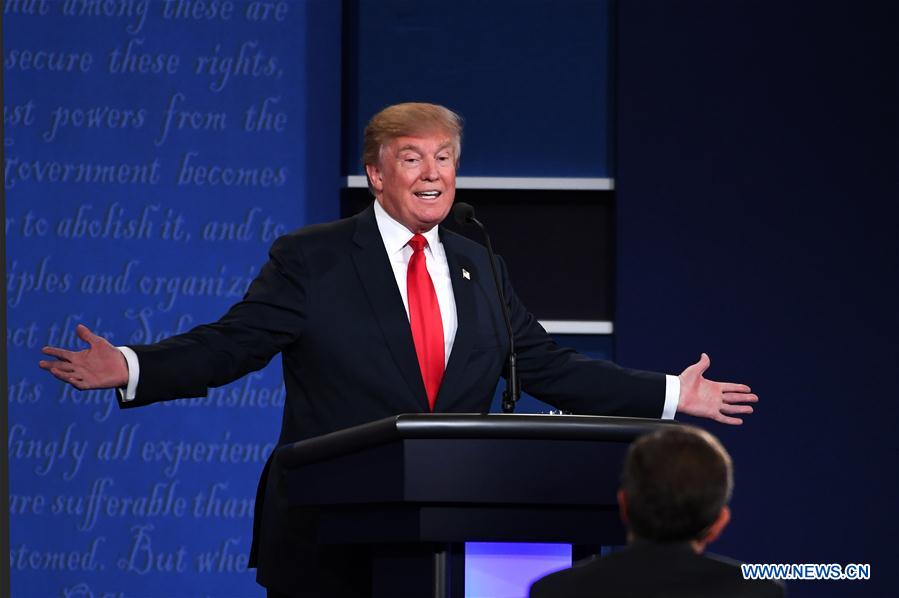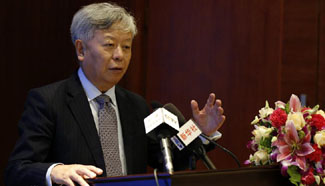
Republican presidential candidate Donald Trump participates in the third and final presidential debate at the University of Nevada Las Vegas (UNLV) in Las Vegas, Nevada, the United States, Oct. 19, 2016.(Xinhua/Yin Bogu)
By Matthew Rusling
WASHINGTON, Oct. 25 (Xinhua) -- With clock ticking toward Election Day, U.S. Republican presidential candidate Donald Trump fails to broaden his support base to appeal to moderate supporters because of his refusal to concede a possible defeat, experts said.
While much can happen in the next two weeks and anything is possible, Democratic candidate Hillary Clinton is now having a sizable lead over Trump in the polls, so close to Election Day on Nov. 8.
Though Trump has energized his supporters - mostly white, blue-collar Americans - like perhaps no other Republican candidate in recent memory, he needs more than just that demographic to clinch the White House, experts said.
Analysts have for months said Trump needs to reach out to more moderate and independent voters, but the brash billionaire has still not made a concerted effort to do so. While there have been moments in which Trump appeared more presidential, he remains overall the same bombastic candidate who turns off voters with comments that many view as outlandish.
Last Wednesday' s third presidential debate held in Las Vegas, Nevada underscored this. Trump fared well against rival Clinton on a number of arguments, hitting her on issues from the economy to national security, but he erased those gains with just one statement, in which he refused to say whether he would concede if he loses the race.
Trump later said that he would totally accept the election results only if he wins.
Critics noted that this is against the 200-year-old U.S. tradition of the loser admitting defeat and handing over power to the winner in elections.
"It is very late for Trump to broaden his support. Most of what he has been discussing in recent weeks appeals to his conservative base, but not undecided voters," Darrell West, vice president and director of governance studies of the Brookings Institution, told Xinhua.
West said that the undecided voters who don' t like Trump's incendiary comments on women and minorities see the New York billionaire as rude and intolerant of other people coming from different backgrounds as himself.
"This makes it difficult for him to appeal to undecided people. Most of their initial impressions of Trump are negative and it is not clear what he can do in the last two weeks that is going to change the outcome," West said.
Seventy percent of voters believe Trump should concede defeat if he loses, West said, referring to a recent Morning Consult survey.
"There will be lots of criticism of him if he does not concede on election night," West added.
Dan Lee, an assistant professor at the University of Nevada in Las Vegas, where the third presidential debate was held, echoed those thoughts.
"This is another case where Trump's statement plays well to his core supporters but does not sit well with traditional Republicans or undecided voters," Lee told Xinhua.
"Accepting defeat and allowing for the legitimate transfer of power to the newly elected president is a vital part of a strong democracy. Even after the controversial outcome of the 2000 election, Gore conceded defeat and viewed the outcome as legitimate," he said.
Lee was referring to the Al Gore vs. George W. Bush election that was so close that the Supreme Court had to decide the outcome, which was accepted by Gore.
The problem for Trump is that he needs to expand his support, since he is behind in the race, Lee said.
"Making a statement like this won't help him sway undecided or third party supporters his way. There has been a shift of independents into Clinton's camp over the past few weeks, and this statement will likely contribute to that trend," he said.












